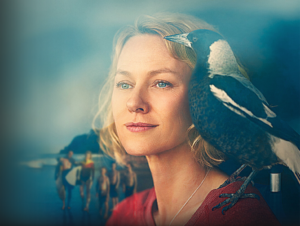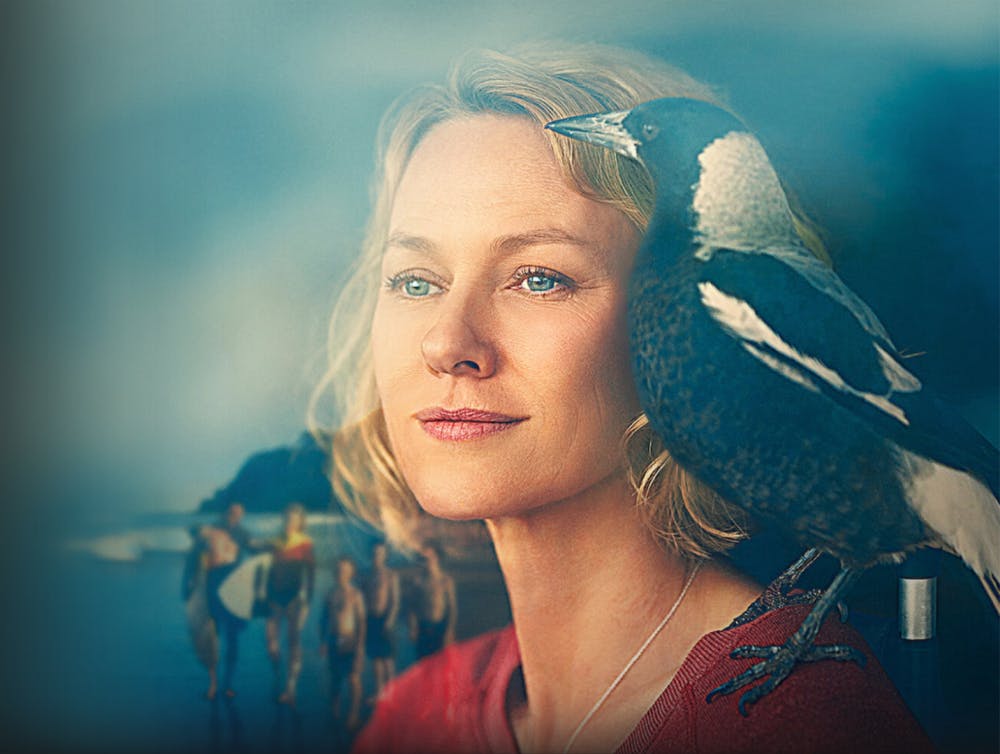By Zoe Talbot
Staff Writer
If we have learned anything from the events of the past year, it’s that we are never truly sure of what tomorrow will bring. Based on the Australian novel by Cameron Bloom and Bradley Trevor Greive, “Penguin Bloom” follows the Bloom family and the aftermath of the unexpected.

After a tragic fall in Thailand due to a broken handrail, Sam Bloom (Naomi Watts), suffers from a T6 spinal cord injury and is paralyzed from the chest down. The film explores both the mental and physical toll this injury takes on the mother of three and avid surfer, approximately a year after the accident.
Meanwhile, her high-school sweetheart turned husband, Cameron (Andrew Lincoln), lives in a constant state of wondering whether he is doing what Sam needs as both a partner and a caretaker. Her children live with guilt when they do activities that she would have loved, such as eating dinner on the beach, or having fun skating on the roof. However, the Blooms’ lives begin to change when their oldest son, Noah (Griffin Murray-Johnston), brings home an injured Magpie, who he names Penguin for her black and white feathers. As Penguin gets healthier and recovers, Sam realizes it may be her turn to learn how to fly again.
The film, beginning with videos of the family’s adventures, depicts what a carefree soul Sam Bloom is. She loves the world, the water, and adventure. This smiling woman is a huge juxtaposition to the pained woman we see wake up in the following shot. The audience sees her unable to perform tasks that we take for granted in our daily lives – checking on her sick children or getting dressed without help from her husband – and Watts’ performance makes the heart hurt even more.
The audience watches as Sam falls deeper into a depression that results from her injury, devastated that she is becoming a shell of the venturesome woman she was just a year ago. Whether she is struggling to stay strong in front of her three sons, or lost in her own dark thoughts, our protagonist always feels very real and raw.
The rest of her family’s dynamic addresses the struggle of having a loved one who is suffering — what are they doing, or not doing, to help her? Will their love and compassion for her situation ever be enough? Sam finds herself desperately searching for ways to be independent, creating a gap between herself and her loved ones as she attempts to feel like her old self.
As Penguin the Magpie becomes a part of the Bloom family, we witness the two grow to become more fond of each other as they begin to heal with one another unintentionally. This relationship is extremely heartwarming to watch unfold, and the family’s bond over the bird they lovingly deem “Peng” seems so genuine and full of love.
The parallels between Sam and Penguin can be predictable and glaringly obvious at times, but there is still a sense of growth and strength in each that empowers the other. Sam starts to go out more, and when Penguin regains flight, Sam is encouraged to try kayaking because it does not require the use of her legs.
The pair rise and fall together, and the rest of the family grows closer as a result of their love for both of them. It’s obvious that this family would go through anything for both Sam and Penguin, and the heartwarming duo is both silly and sweet in the best ways possible.
The story itself is powerful, and some of the shots are shocking and distressing, but overall I’d note that the narrative is not extremely elevated by the visual format. I felt as if the film had a lot of opportunities to deepen a connection or utilize specific visual sequences differently to emphasize their message, but some of the powerful moments came up short by either moving onto the next scene or not fully fleshing out the shot visually.
However, Watts’ elaborate protagonist creates an environment that you cannot help but cheer for, and feel for in every moment of her journey. The film’s depiction of a family shaken by tragedy and grief is similar to many others of its kind. But it stands out by creating an environment for the characters to be resentful and distraught with circumstances that cannot be helped, while addressing the constant frustration and turmoil Sam experiences.
I would absolutely recommend streaming “Penguin Bloom” on Netflix for the range of emotions the audience can feel as the Blooms come to remember that nothing is more important than family.







